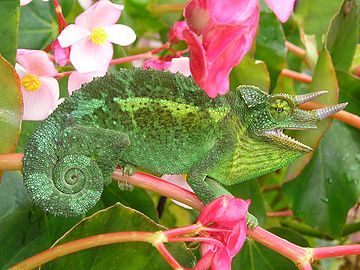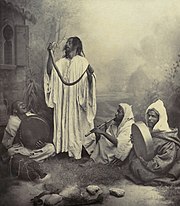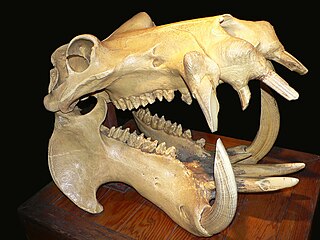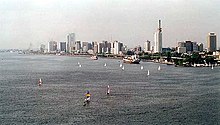Portal:Africa



Africa is the world's second-largest and second-most populous continent after Asia. At about 30.3 million km2 (11.7 million square miles) including adjacent islands, it covers 20% of Earth's land area and 6% of its total surface area. With nearly 1.4 billion people as of 2021, it accounts for about 18% of the world's human population. Africa's population is the youngest among all the continents; the median age in 2012 was 19.7, when the worldwide median age was 30.4. Based on 2024 projections, Africa's population will reach 3.8 billion people by 2099. Africa is the least wealthy inhabited continent per capita and second-least wealthy by total wealth, ahead of Oceania. Scholars have attributed this to different factors including geography, climate, corruption, colonialism, the Cold War, and neocolonialism. Despite this low concentration of wealth, recent economic expansion and a large and young population make Africa an important economic market in the broader global context. Africa has a large quantity of natural resources and food resources, including diamonds, sugar, salt, gold, iron, cobalt, uranium, copper, bauxite, silver, petroleum, natural gas, cocoa beans, and.
Africa straddles the equator and the prime meridian. It is the only continent to stretch from the northern temperate to the southern temperate zones. The majority of the continent and its countries are in the Northern Hemisphere, with a substantial portion and a number of countries in the Southern Hemisphere. Most of the continent lies in the tropics, except for a large part of Western Sahara, Algeria, Libya and Egypt, the northern tip of Mauritania, and the entire territories of Morocco and Tunisia, which in turn are located above the tropic of Cancer, in the northern temperate zone. In the other extreme of the continent, southern Namibia, southern Botswana, great parts of South Africa, the entire territories of Lesotho and Eswatini and the southern tips of Mozambique and Madagascar are located below the tropic of Capricorn, in the southern temperate zone.
Africa is highly biodiverse; it is the continent with the largest number of megafauna species, as it was least affected by the extinction of the Pleistocene megafauna. However, Africa is also heavily affected by a wide range of environmental issues, including desertification, deforestation, water scarcity, and pollution. These entrenched environmental concerns are expected to worsen as climate change impacts Africa. The UN Intergovernmental Panel on Climate Change has identified Africa as the continent most vulnerable to climate change.
The history of Africa is long, complex, and varied, and has often been under-appreciated by the global historical community. In African societies the oral word is revered, and they have generally recorded their history via oral tradition, which has led anthropologists to term them oral civilisations, contrasted with literate civilisations which pride the written word. During the colonial period, oral sources were deprecated by European historians, which gave them the impression Africa had no recorded history. African historiography became organized at the academic level in the mid-20th century, and saw a movement towards utilising oral sources in a multidisciplinary approach, culminating in the General History of Africa, edited by specialists from across the continent. (Full article...)
Selected article –
Rhapta (Ancient Greek: Ῥάπτα and Ῥαπτά) was an emporion said to be on the coast of Southeast Africa, first described in the 1st century CE. Its location has not been firmly identified, although there are a number of plausible candidate sites. The ancient Periplus of the Erythraean Sea described Rhapta as "the last emporion of Azania", two days' travel south of the Menouthias islands (Chapter 16). The Periplus also states that the city and port were ruled by South Arabian vassals of the Himyarite kingdom, particularly a certain "Mapharitic chieftain."
According to Claudius Ptolemy, Diogenes, a merchant in the Indian trade, was blown off course from his usual route from India, and after travelling 25 days south along the coast of Africa arrived at Rhapta, located where the river of the same name enters the Indian Ocean opposite the island of Menouthias. Diogenes further describes this river as having its source near the Mountains of the Moon, near the swamp whence the Nile was said to also have its source. Ptolemy also mentions another Greek captain, called Theophilos, who took twenty days to travel from the Horn of Africa to Rhapta. (Full article...)
Featured pictures –
Did you know (auto-generated) -

- ... that land for a library built for African Americans in Virginia was donated by Pope Pius XII?
- ... that American doctor Cory Synhorst SerVaas believed that high-lysine corn could help end hunger in Africa, end famine, and stop protein deficiency despite only being fed to livestock and poultry?
- ... that ten years after publishing the book Great South African Christians, Horton Davies gave a speech criticizing South African churches and synagogues for their role in apartheid?
- ... that Malaysian businessman Lim Kok Wing was depicted as "King of Africa"?
- ... that Central City College was established as an African American-led alternative to the historically black Atlanta Baptist College?
- ... that Olive MacLeod journeyed 6,000 km (3,700 mi) through Africa in 1910–1911 to visit her murdered fiancé's grave, and wrote a book based on her observations?
Categories
Selected biography –
Ahmose I (Amosis, Aahmes; meaning "Iah (the Moon) is born") was a pharaoh and founder of the Eighteenth Dynasty of Egypt in the New Kingdom of Egypt, the era in which ancient Egypt achieved the peak of its power. His reign is usually dated to the mid-16th century BC at the beginning of the Late Bronze Age.
During his reign, Ahmose completed the conquest and expulsion of the Hyksos from the Nile Delta, restored Theban rule over Lower- and Upper Egypt, and successfully reasserted Egyptian power in its formerly subject territories of Nubia and Canaan. He then reorganized the administration of the country, reopened quarries, mines and trade routes and began massive construction projects of a type that had not been undertaken since the time of the Middle Kingdom. This building program culminated in the construction of the last pyramid built by native Egyptian rulers. Ahmose's reign laid the foundations for the New Kingdom, under which Egyptian power reached its peak. (Full article...)
Selected country –
 |
 |
|

| ||
Gabon, or the Gabonese Republic, is a country in west central Africa. It borders on Equatorial Guinea, Cameroon, the Republic of the Congo and the Gulf of Guinea. Since its independence from France on August 17, 1960, the Republic has been ruled by only two autocratic presidents; the incumbent El Hadj Omar Bongo Ondimba has been in power since 1967 and is currently Africa's longest-serving head of state. Gabon introduced a multiparty system and a new democratic constitution in the early 1990s that allowed for a more transparent electoral process and for reforms of governmental institutions.
Gabon has at least forty ethnic groups with separate languages and cultures, of which the Fang are generally thought to be the largest. A small population, abundant natural resources (including offshore petroleum reserves), and foreign private investment have helped make Gabon one of the most prosperous countries in the region, with a per capita income of four times the average for Sub-Saharan Africa, although the distribution of income from this industry is extremely unequal. (Read more...)
Selected city –
Lagos (/ˈleɪɡɒs/ LAY-goss; also US: /ˈlɑːɡoʊs/ LAH-gohss; Yoruba: Èkó), or Lagos City, is a large metropolitan city in southwest Nigeria. With an upper population estimated above 21 million dwellers, it is the largest city in Nigeria, and the most populous urban area on the African continent. Lagos was the national capital of Nigeria until the government's December 1991 decision to move their capital to Abuja in the centre of the country. Lagos is a major African financial centre and is the economic hub of Lagos State and Nigeria at large. The city has a significant influence on commerce, entertainment, technology, education, politics, tourism, art, and fashion in Africa. Lagos is also among the top ten of the world's fastest-growing cities and urban areas. In 2024, Time Out magazine ranked Lagos as the 19th Best City to visit in the World. A megacity, it has the fourth-highest GDP in Africa, and houses one of the largest and busiest seaports on the continent. Due to the large urban population and port traffic volumes, Lagos is classified as a Medium-Port Megacity.
Lagos emerged as a home to the Awori subgroup of the Yoruba of West Africa in the 15th century, which are contained in the present-day Local Government Areas (LGAs) of Lagos Island, Eti-Osa, Amuwo-Odofin and Apapa. Before the 15th century, the Awori settled on a Farmstead along the coastal line in and around which they worked and lived. The Farmstead translates to Ereko in Yoruba, from which comes the Lagos indigenous name "Eko". The lands are separated by creeks, fringing the southwest mouth of Lagos Lagoon, while being protected from the Atlantic Ocean by barrier islands and long sand spits such as Bar Beach, which stretch up to 100 km (62 mi) east and west of the mouth. Due to rapid urbanisation, the city expanded to the west of the lagoon to include areas in the present day Lagos Mainland, Ajeromi-Ifelodun, and Surulere. This led to the classification of Lagos into two main areas: the Island, which was the original city of Lagos, and the Mainland, which it has since expanded into. This city area was governed directly by the Federal Government through the Lagos City Council, until the creation of Lagos State in 1967, which led to the splitting of Lagos city into the present-day seven Local Government Areas (LGAs), and an addition of other towns (which now make up 13 LGAs) from the then Western Region to form the state. (Full article...)
In the news
- 8 February 2025 – Democratic Republic of the Congo–Rwanda conflict
- A crisis summit is held involving the regional blocs SADC and the EAC, along with Rwandan President Paul Kagame. The DR Congo is represented by Prime Minister Judith Suminwa, while President Félix Tshisekedi attends virtually. The blocs call for a ceasefire and negotiations involving the M23 movement, while the Congolese do not comment. (BBC) (CNN)
- 7 February 2025 – Kivu conflict
- The United Nations and the Democratic Republic of the Congo communications minister Patrick Muyaya recognize that most of the 165 female prisoners of the Goma prison in North Kivu who were raped by escaping male inmates a week ago died in the ensuing fire. (CNN) (The Guardian)
- 7 February 2025 – Mali War
- Between 45 to 60 civilians are killed after an ambush by Islamic State gunmen against a convoy of buses in Gao, Mali. (Xinhua)
- 7 February 2025 – Somali Civil War
- The Somali National Army, supported by local Ma'awisley clan militias, kills dozens of al-Shabaab insurgents during heavy clashes which erupted after allied forces launch an offensive targeting al-Shabaab stronghold positions in the Jicibow area of Shebelle River, Hiiraan, Somalia. (Hiiraan Online)
- 7 February 2025 – South Africa–United States relations, Racism in South Africa
- U.S. President Donald Trump orders a freeze on all foreign aid to South Africa citing a South African law that allegedly allows land to be forcibly seized from white farmers. Trump also calls for the U.S. to accept Afrikaner refugees to protect them from "government-sponsored race-based discrimination". (NDTV)
- 6 February 2025 – Kivu conflict
- Malawian President Lazarus Chakwera orders Malawian troops to withdraw from peacekeeping operations in the Democratic Republic of the Congo as the crisis escalates. Three Malawian soldiers have been killed in recent fighting in North Kivu. (BBC News)
Updated: 21:05, 9 February 2025
General images -
Africa topics
More did you know –
- ... that Dutch malacologist Adolph Cornelis van Bruggen is an expert in African land snails?
- ... that a 20‑day study reported by BirdLife International discovered 265 species of birds in Nki National Park?
- ... that Kalulu, an African boy who died in 1877, was modeled in Madame Tussauds and attended Dr. Livingstone's funeral in London?
- ... that Samuel Jackman Prescod became the first person of African descent elected to the Parliament of Barbados?
Related portals
Major Religions in Africa
North Africa
West Africa
Central Africa
East Africa
Southern Africa
Associated Wikimedia
The following Wikimedia Foundation sister projects provide more on this subject:
-
Commons
Free media repository -
Wikibooks
Free textbooks and manuals -
Wikidata
Free knowledge base -
Wikinews
Free-content news -
Wikiquote
Collection of quotations -
Wikisource
Free-content library -
Wikispecies
Directory of species -
Wikiversity
Free learning tools -
Wikivoyage
Free travel guide -
Wiktionary
Dictionary and thesaurus
























































































